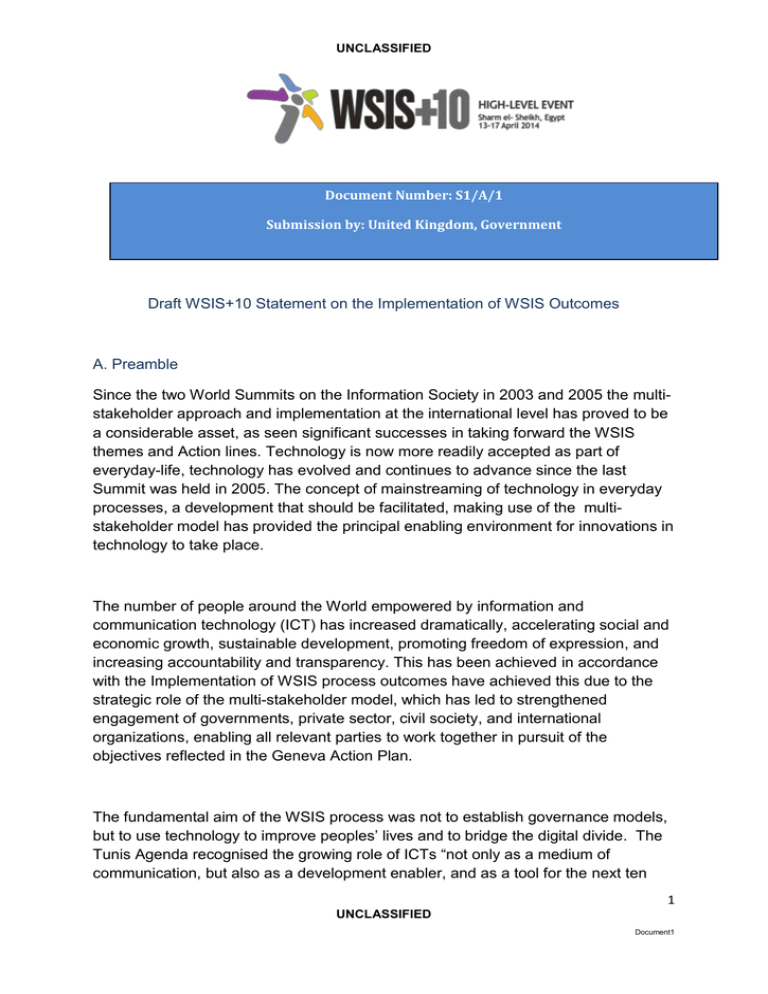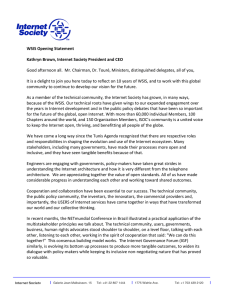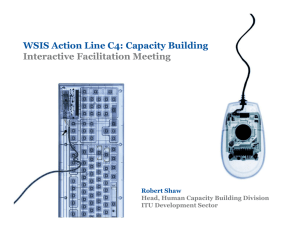Draft WSIS+10 Statement on the Implementation of WSIS Outcomes A. Preamble
advertisement

UNCLASSIFIED Document Number: S1/A/1 Submission by: United Kingdom, Government . Draft WSIS+10 Statement on the Implementation of WSIS Outcomes A. Preamble Since the two World Summits on the Information Society in 2003 and 2005 the multistakeholder approach and implementation at the international level has proved to be a considerable asset, as seen significant successes in taking forward the WSIS themes and Action lines. Technology is now more readily accepted as part of everyday-life, technology has evolved and continues to advance since the last Summit was held in 2005. The concept of mainstreaming of technology in everyday processes, a development that should be facilitated, making use of the multistakeholder model has provided the principal enabling environment for innovations in technology to take place. The number of people around the World empowered by information and communication technology (ICT) has increased dramatically, accelerating social and economic growth, sustainable development, promoting freedom of expression, and increasing accountability and transparency. This has been achieved in accordance with the Implementation of WSIS process outcomes have achieved this due to the strategic role of the multi-stakeholder model, which has led to strengthened engagement of governments, private sector, civil society, and international organizations, enabling all relevant parties to work together in pursuit of the objectives reflected in the Geneva Action Plan. The fundamental aim of the WSIS process was not to establish governance models, but to use technology to improve peoples’ lives and to bridge the digital divide. The Tunis Agenda recognised the growing role of ICTs “not only as a medium of communication, but also as a development enabler, and as a tool for the next ten 1 UNCLASSIFIED Document1 UNCLASSIFIED years. For example, achievement of the internationally agreed development goals and objectives, including the Millennium Development Goals”. Disappointment with, or lack of capacity resulting from, poor delivery of development goals so far has increased criticism of the multi-stakeholder model; while we should recognise that work on the WSIS track, separately from the Development Agenda track; has further reduced the chances of overcoming the digital divide. We should therefore redouble our efforts to ensure the benefits of the Internet can be realised by all, and seek rationalisation in the structures, through combining those development aspects of WSIS in which we have still not succeeded into the post-2015 Development Goals. We also need to consider, more generally, to what extent WSIS Action Lines have been achieved, and can be therefore concluded; or can be mainstreamed into ongoing fora/work (as above with the Development Agenda); or need to be continued. To ensure success in this endeavour, the Internet Governance Forum (IGF) should be considered as an additional key facilitator for a number of the current WSIS Actions lines, especially those relating to WSIS Action Line C2, C3, C4, C5, C7 and C10. 2 UNCLASSIFIED Document1

